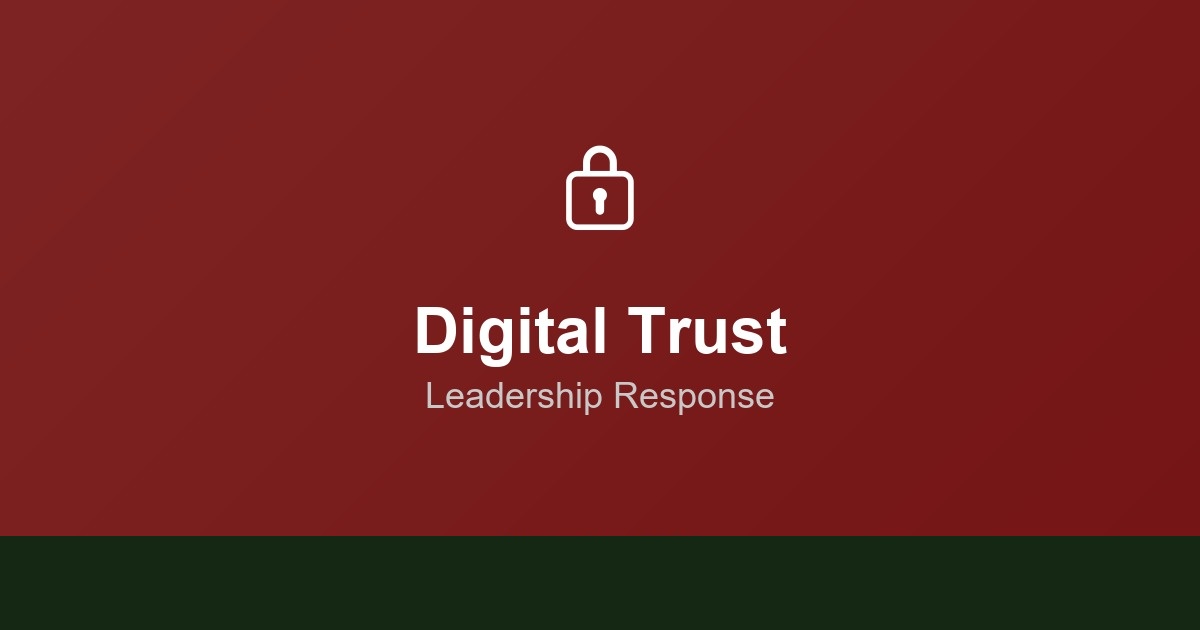The Erosion of Trust: Why Sam Altman's Social Media Critique Resonates with Enterprise Leaders

In an era defined by digital connectivity, trust has become the most valuable currency. Recent remarks from OpenAI CEO Sam Altman, stating that social media is now "too fake to trust," strike a chord that resonates deeply within the enterprise sector. While often perceived as a consumer-centric issue, the pervasive erosion of trust in digital platforms carries significant implications for businesses, impacting everything from brand reputation and customer engagement to data integrity and strategic decision-making.
In an era defined by digital connectivity, trust has become the most valuable currency. Recent remarks from OpenAI CEO Sam Altman, stating that social media is now "too fake to trust," strike a chord that resonates deeply within the enterprise sector. While often perceived as a consumer-centric issue, the pervasive erosion of trust in digital platforms carries significant implications for businesses, impacting everything from brand reputation and customer engagement to data integrity and strategic decision-making.
The Business Impact of a "Fake" Digital Landscape
For enterprise businesses, the authenticity crisis in social media is not merely a matter of public perception; it's a tangible threat to Return on Investment (ROI) and measurable outcomes. Consider the following:
- Brand Credibility and Reputation Management: In a landscape rife with misinformation and synthetic content, maintaining a credible brand voice becomes exponentially harder. A single viral falsehood can inflict severe damage, leading to decreased customer loyalty and a direct hit to market valuation. Enterprises invest heavily in digital marketing and PR; if the channels themselves are compromised, the efficacy of these investments is undermined.
- Customer Engagement and Trust: Authentic engagement drives conversions. When customers perceive social platforms as untrustworthy, their willingness to interact with brands, share personal data, or make purchasing decisions based on social recommendations diminishes. This directly impacts sales funnels and customer lifetime value.
- Data Integrity and Market Intelligence: Businesses rely on social listening and sentiment analysis for critical market intelligence. If the data streams are polluted with bot-generated content, manipulated narratives, or deepfakes, the insights derived become unreliable. This can lead to flawed strategic decisions, misallocated resources, and missed market opportunities.
- Employee Advocacy and Internal Communications: Many organizations encourage employee advocacy on social media. However, if employees themselves lose faith in the platforms, or if their authentic voices are drowned out by noise, the potential for organic reach and genuine connection is lost. Furthermore, internal communications that leverage social tools can suffer from a lack of perceived legitimacy.

Navigating the Trust Deficit: A Path to Measurable Outcomes
Altman's observation serves as a critical call to action for enterprise leaders. Rather than retreating from digital engagement, the imperative is to adapt and innovate with a focus on re-establishing trust and securing measurable business benefits. Here’s how:
1. Invest in Authenticity and Transparency: Prioritize genuine content creation, transparent communication, and verifiable claims. Leverage technologies that can help authenticate content origins and combat deepfakes. This investment translates into stronger brand equity and more reliable customer relationships.
2. Strategic Platform Selection: Evaluate social media platforms not just for reach, but for their commitment to combating misinformation and fostering genuine interactions. Diversify digital presence to reduce reliance on single, potentially compromised channels. Focus on platforms where your target audience engages authentically.
3. Advanced Analytics for Trust Signals: Implement sophisticated AI and machine learning tools to discern genuine engagement from artificial amplification. Focus on metrics that indicate true human interaction and sentiment, providing more accurate market insights and a clearer picture of ROI from social initiatives.
4. Educate and Empower Stakeholders: Train marketing, sales, and communications teams on the evolving digital trust landscape. Empower employees to be authentic brand ambassadors while providing them with the tools to identify and report suspicious activity.
Conclusion: Rebuilding the Digital Foundation
Sam Altman's stark assessment of social media is a wake-up call for the enterprise. The era of uncritical digital engagement is over. For businesses to thrive and achieve their strategic objectives, they must proactively address the trust deficit. By prioritizing authenticity, leveraging advanced analytics, and making informed platform choices, enterprises can transform the challenge of a "fake" digital world into an opportunity to build stronger, more resilient, and ultimately more profitable relationships with their customers and stakeholders. The ROI of trust has never been higher.
References
- Industry research and analysis from leading AI technology providers and research institutions.
- Enterprise AI implementation case studies and ROI analysis from Fortune 500 companies.
- Market research reports from Gartner, McKinsey, and other leading consulting firms on AI adoption trends.
- Technical documentation and whitepapers from AI platform vendors and service providers.
- Regulatory compliance frameworks and guidelines for AI implementation in enterprise environments.
Ready to Implement AI in Your Enterprise?
Our team of AI experts can help you navigate the complex landscape of AI infrastructure and implementation. Book a free consultation to discuss your specific needs.
Book Free Consultation